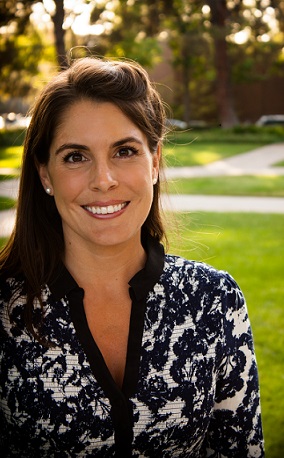 myCSUSM
myCSUSMFaculty Highlights
April Anderson
May 2015

Interview with April Anderson by Lauren Springer.
LS: Why did you choose to be a creative writing major when you earned your BA?
AA: I chose it because I always loved writing and reading from the time I was really young, and doing these two things helped me to understand myself and my place in the world, as well as other people’s situation in the world. Writing gave me a way to express some of the things I was trying it figure out in that time in my life, which is why I still like writing, and reading expanded my capacity for compassion and love by helping me see the point of view of others.
LS: Do you share these ideas with your students?
AA: I share with them my own personal journey in academia, specifically with writing and reading, but we also talk a lot about the practical application of writing and reading and constructing an argument – even as something as simple and everyday as talking with a roommate about not cleaning up his or her fair share of an apartment. In other words, we all are writers in some fashion, whether or not we realize it yet.
LS: What advice do you have for GEW students when it comes to writing arguments?
AA: The number one piece of advice, I think, is it’s important to learn how to express yourself, and if you can learn how to persuasively present your ideas (become a rhetorician!), then you can learn how to master your communication and influence other people… and this is a valuable skill to take into the rest of your life and it is certainly a skill you need in any profession.
LS: What do you like most about teaching at CSUSM?
AA: I love the students the most. Because CSUSM is a public university, students can come here and get an affordable and excellent education. This means students want to come and learn, and I feel incredibly honored to be a part of their academic journey and teach them something that will be so very useful to them for the rest of their lives.
LS: I know you’re currently working on your Ph.D. What is it in, and why did you choose to study that subject at the highest level?
AA: Really, it goes back to my lifelong passion for the written word, both producing it and consuming it. I consider myself a lifelong learner. The reason I chose to go this far in school is because I wanted to get as much as I possibly could from my formal education, but in terms of informal education, I will continue learning until the day I die. Specific to my field, I’m writing my dissertation on American poets who write the sublime in subversive ways. I chose that topic because I’m really interested in metaphysics, aesthetics, and the entire experience with the Divine. Since poetry is the genre I enjoy studying most, I took my interest in the spiritual realm and applied it to poetry.
LS: I know you’re a managing editor of a poetry journal. Tell me a bit about it.
AA: The journal is Foothill: journal of poetry. We’re the only journal in the US that exclusively publishes graduate-student poetry, and in each issue we include an interview with a well-known poet (last one was with Claudia Rankine) and feature a local student-artist’s work. Our team consists of about ten students; we get together every Friday night to go through the submissions. It’s a lot of fun looking at the work the famous poets of the future are creating now, and we get into some really lively conversations about what a poem is or what a good poem is, or what a bad poem looks like. Given all of our varying tastes, we have some spirited discussions/arguments about the work.
LS: Since you have to balance your workload as a student and as an instructor, what is a piece of advice you’d give your current and future students?
AA: One of my favorite quotes is from one of my professors at CGU. Professor Ferrell says, “There’s no such thing as an academic emergency.” This is something I really try to take to heart because I think it’s very easy to feel like what we’re doing in our studies and/or scholarship is the most important thing, but keeping balance, taking really good care of yourself, is the most important thing. Since keeping balance and perspective is something difficult for any student to do, especially during finals week, this would be the one message I’d want to convey: stay balanced…and do yoga!






